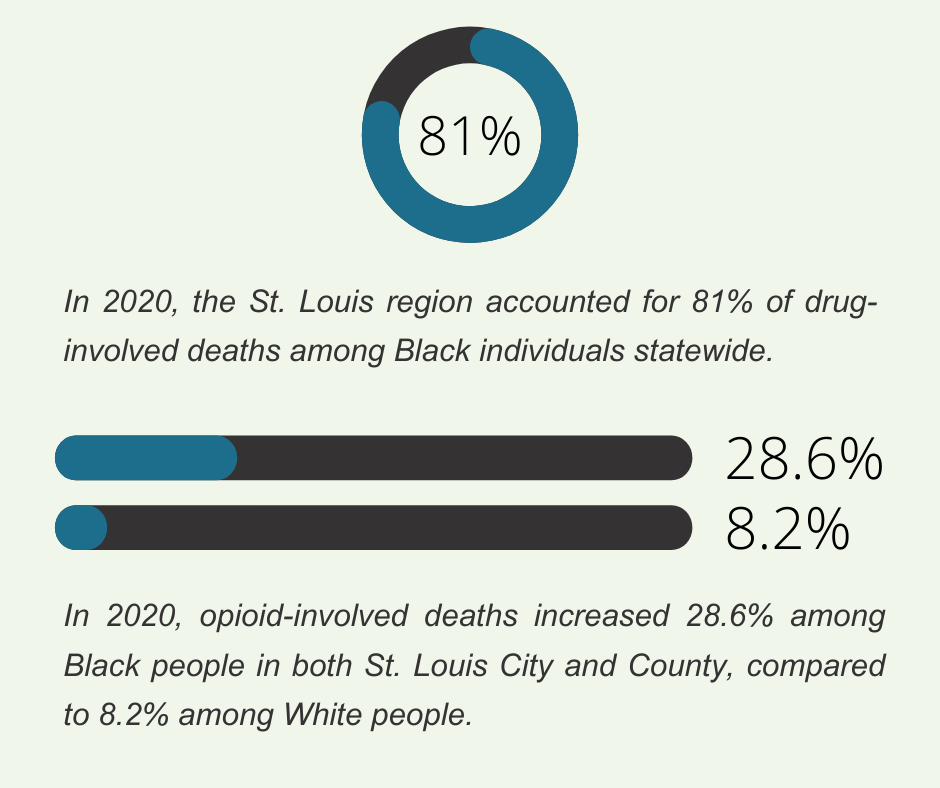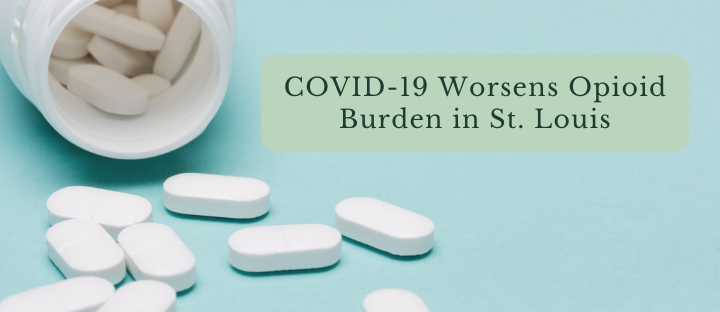COVID-19 has not only worsened existing problems in the United States such as unemployment, poverty, evictions, and societal stress, but has also led to intense social isolation, disrupted drug supplies, and reduced access to support services for many people across the state and country. As a result, the global pandemic has exacerbated the opioid crisis throughout Missouri and the United States as a whole.
The City and County of St. Louis have seen an especially high increase of drug-related fatalities and overdoses. The St. Louis Metro region continues to account for over half of all overdose deaths in the state of Missouri.1 Overdoses increased by 18% in the early months of the pandemic as compared to the same timeframe of 2020, and the City of St. Louis had 36% more overdoses.2

Unfortunately, Black residents are disproportionately burdened by this crisis in St. Louis. In 2020, the St. Louis region accounted for 81% of drug-involved deaths among Black individuals statewide. Opioid-involved deaths increased 28.6% among the Black population in both St. Louis City and County, compared to only 8.2% among the White population.1
Fortunately, St. Louis has seen tremendous support and engagement from our community-based organizations and partners who are tackling this complicated public health crisis.
The CENTER (Community ENgagement, Trauma, Equity, and Renewal) Initiative project, funded by the Missouri Foundation for Health, focuses on improving the health of and investment in Black people who use drugs in St. Louis and are most affected by addiction and overdose. Through community-centered information gathering, community education and empowerment, community-centered intervention, and sustained community partnership, the project will lay the foundation to support the health and wellness of Black people who use drugs in North St. Louis through direct outreach and community-established recommendations for change.
The EPICC (Engaging Patients in Care Coordination) project, funded by the Behavioral Health Network builds collaborative infrastructure to expedite access to Medication-Assisted Treatment (MAT) and peer-based coordination of care from emergency departments to community-based settings for those who present with or are at high risk for an opioid-related overdose. Peer Recovery Coaches perform outreach 24/7 to accept referrals, enhance engagement and maintain contact to support access to services, foster recovery, and reduce overdose rates. EPICC also works closely with MO Hope Project to provide opioid overdose education and distribute Narcan (a medication that blocks opioids and reverses overdose) to prevent overdose and reduce harm.
As we move to our “new normal” we need to continue to be conscious of our efforts engaging the general public about mental health and substance use, and centering communities in our efforts, making addiction treatment more flexible, accessible, and available.
For more information, check out this infographic provided by the Missouri Institute of Mental Health and noMOdeaths.org.
Citations
- “2020 St. Louis City and County Drug-Involved Deaths” infographic provided by the Missouri Institute of Mental Health
- St. Louis City and County Medical Examiners and Departments of Public Health

